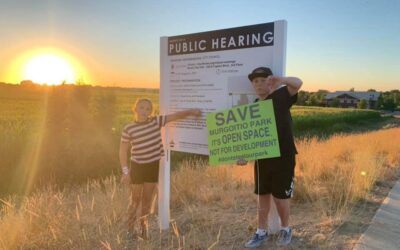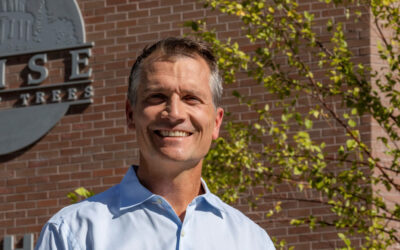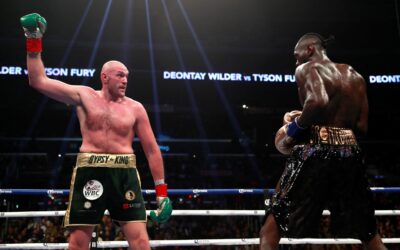1. Please briefly summarize your background and experience relevant to service on the Boise City
I grew up in Pennsylvania, have a BS in Biology from Penn State and an MS in Biology from Utah State, where I was a teaching assistant in Botany, Ecology, Ornithology and other courses. I’ve always loved the outdoors and been an avid walker and hiker. I’ve lived in Idaho for over 30 years, and in Boise for over 20 years. I worked for a decade for the Idaho Department of Fish and Game’s Habitat Improvement Program. I advised landowners, wildlife conservation groups and state and federal agencies on wildlife habitat protections and plantings, worked with volunteers, and conducted public outreach.
For the past 2 decades, I’ve worked for non-profit groups on complex public lands issues – grazing, forests, energy military expansion, and species and wild lands protections). I’ve spent thousands of hours in the field in Idaho, Oregon and Nevada documenting fish and wildlife habitat and watershed conditions and scrutinizing agency proposals for public lands. This work also involves endless hours poring over complex government analysis documents and reports to understand their contents, and submitting detailed comments, interacting with agency staff, and at times challenging agency decisions.
I was long complacent about City issues and believed all was well. Around 5 years ago, I woke up, after experiencing first-hand the problems with public processes in City decisions. I worked hard on opposing basing F-35s in Boise, as this would have greatly impacted Bench neighborhoods and areas of West Boise, and on other City issues including open space foothills projects and development projects that impacted our affordable housing (Blue Valley, Boise Ave./Ridenbaugh) or impacted the City’s historical values and trees. I have been on the board of Boise Working Together. I’ve submitted many comments to City Council and have often testified on projects and issues outside my neighborhood.
2. The decision to elect Boise City Council members by district was not something the City of Boise sought. State government imposed the districts, and, in fact, the City vigorously opposed this recent electoral reform. How do you propose to create greater balance and equity among all sectors of this city and its neighborhoods? Do you agree, or disagree, that City Hall has treated areas within Boise differently?
One of the main things you learn as an ecologist or wildlife biologist is that things are inter- connected. It’s the same with the City and neighborhoods, which in reality are artificial lines drawn on a map. Our major streets often run right through several “neighborhoods” on maps and so does the traffic on them. The air shed and the air we breathe isn’t restricted to neighborhood boundaries. Nor are our growth issues that are affecting all of us.
Yes different areas are treated differently primarily because of voter turnout. When you look at the maps of voter turn-out in precincts, it’s startling. Often folks elected to City council didn’t look at how connected we really are. My record shows I have often spoken out on issues across the city and I will continue to work for all of Boise if elected.
One of the things I want to do as a council member if elected is work to get a 30 minute time slot at council meetings where any Boise resident can talk to the council members and mayor, and voice what is on their mind – present ideas, raise concerns about issues, etc.
3. Do you believe the current Mayor and City Council have properly engaged with the public on major projects and conducted all business in open meetings?
I believe there has been a loss of fair and full public process in the past several years. This is what made me wake up around 5 years ago and start paying attention to City issues. These problems pre-date Mayor Mclean, but seem to have become engrained in the way the City now conducts business. In knocking on doors in neighborhoods and talking to people, I’ve found that other Boiseans have sensed the same thing. People feel that decisions are already made before they even get a chance to testify.
An increasingly pervasive element is the City’s use of expensive PR firms on projects and issues, and public opinion is shaped to be in line with what leadership wants.
I believe the first step in any major project is giving the public basic, factual information. For example, with the Zoning Code re-write, the first step should have been contacting all Boise residents and describing what the particular Zone they live in, and what that means – such as density and uses allowed. Then residents on the Zones in each neighborhood should have been asked what their concerns were, and if they want their area’s or neighborhoods zoning changed. Instead, Boise residents were faced filling out questionnaires that said the equivalent of: “Do you think the zoning code is complicated”, and then asked a whole series of questions aimed at getting people to agree that Boise’s zoning code was bad because it was too complicated to understand.
If not, how would you improve upon their current practices? I would work to:
– Hold a Public Comment period at each council meeting (see above). There is a pretty universal feeling across town that people are not being heard.
– End the reliance on PR firms to spin projects to direct an outcome. City staff are professionals in their field, and they are well able to explain to us the basics of project proposals.
-Have more open Council member discussion on important issues and projects in front of the public. Staff attorneys at council meetings should respond to Council questions audibly (unless something actually is attorney client privilege). Ada County had been doing this and there is no reason Boise can’t.
– Push to have the City post more records on-line. This will cut back on City workload for Public Records Requests and provide more answers to people about City business.
4. Do you believe the City has now grown large enough that a City Council position should be a full-time job to really understand the issues and solutions?
I think Council, to understand issues, certainly now has to devote more time with the growth of the City.
This may be a good idea, but I also I think that everybody being provided with more clear basic and factual information at the outset would benefit Boiseans and for council members both.
I would also work to have council agendas and information packets out for at least 2 weeks before meetings – not the Friday before a Tuesday session. BIG HELP for everyone.
5, What are your thoughts on the Blueprint Boise, and do you think it best reflects and represents what the residents want for Boise’s future?
Blueprint Boise was years in preparation, and involved a tremendous amount of public input, engagement, outreach and buy-in. It was a commitment the City made to the public to people and neighborhoods of the City. I believe the public in any areas where changes are proposed should be asked about any changes, and a provided a full land fair process. First ask the people in the areas that would be impacted. Also, new neighborhood plans have since been developed in some areas, and there may be differences between them and Blueprint Boise. Any changes should be made with a full and fair public process, with issues clearly explained to the folks who live in those areas.
6. Do you believe the City is following “smart growth” practices? If so, please provide an example.
What is and isn’t “smart growth” seems to have changed over the years. It isn’t smart growth if we are demolishing affordable housing all the time and not getting truly affordable and attainable housing in return for renters, or not getting starter homes. We must improve transportation. I have long believed that smaller buses and vans reaching into neighborhoods more and running a lot more frequently is key to getting Boiseans to use transit.
What could the City of Boise do to grow job opportunities for the people of this area, particularly higher paying jobs?
First and foremost, Boise must retain its quality of life, and must ensure that we do not destroy the very things that provide Boise’s allure and livability. We must protect our parks, open space, and foothills lands and our neighborhoods and their often unique and diverse character.
7. How could the City of Boise improve upon the education it offers to youth and young adults?
This is really a separate state and School Board issue, and there are separate elections for School Board trustees. They are responsible for this.
Our parks provide a great way to educate children about science through hands on experience – nature walks, pollinator plantings, shrub planting (in foothills), botany, bird-watching, etc. School classes can use parks in many ways. Specifically at the City level, Boise Parks and Rec
could hold more free nature-oriented activities for children. The City is increasingly charging for many park activities which is a concern to me.
8. Do you believe the current Mayor and City Council have protected the environment and use land in a prudent cautious manner? Please provide examples.
Mayor Mclean worked on the initial Foothills acquisitions. The City has acquired Foothills land in the past couple of years, but it may not be firmly protected with necessary legal language.
The Murgoitio Park situation is of great concern to me. Southwest Boise has been promised a regional park for 25 years. It signals that city leaders have long neglected areas of the City. The events of 2021 indicate that some in leadership see our Parks as disposable. The City’s reason to dispose of Parks is supposedly to get more “affordable housing” (which in so many instances turns out not to be affordable for people in this town) – as well as to increase density. Yet this is at the same time that the density is eating into backyards, green space and places for children to play in neighborhoods. If we have less parkland and less green space in neighborhoods, we lose doubly.
I was dismayed to recently learn recently that the City had hired a consultant to survey park land donated by people in wills or purchased at very low prices for park purposes – for potential building sites. This shows a sad disregard for the public interest and will discourage people from making future land donations for open space and parkland.
9. Do you worry that the City’s development practices generate urban sprawl?
Yes.
10. Would you support the residential development of Murgoitio Park?
No!
11.Would you support the City selling other undeveloped and developed park land for more housing?
A firm No on land donated for parks and open space. The City of Boise owns and has variously acquired a lot of land over the years for all kinds of purposes, some of it in complicated deals. I would like to see a good map of all the land the City currently owns, and information on how and for what purpose the land was acquired. Then look at the sites’ current condition, what uses are on it, its location, and what our needs are.
12. Would you support the relocation of the old Log Cabin? (Yes or No).
No.
13. Are you aware that any residential development of Murgoitio Park could violate FAA rules and limit the full military use of Gowen Field?
Yes, because the land was acquired because of airport noise.
14. Do you agree with the Mayor that the Housing First program is the best way to curb homelessness in Boise?
I believe we must stop tearing down existing affordable housing in Boise. When the City grants the gift of a re-zone to an investor/developer in a place where affordable housing would be lost, the City should require the developer to provide affordable housing that is attainable on Idaho wages.
15. What are your priorities for improvements to the City’s police and fire resources?
I would like to see all the fire stations promised to City areas and residents be built to provide for public safety, fire protection and emergency response. I would also like to see much greater care be taken with development in wildfire-prone areas (the Wildland Urban Interface or “WUI” and adjacent areas. With police, I think more community resource officers out in neighborhoods are important.





0 Comments